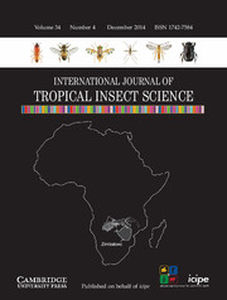Article contents
Effect of fertilizer and crop variety on the survival of Busseola fusca (Lepidoptera: Noctuidae) in cereals in Ethiopia
Published online by Cambridge University Press: 01 December 2007
Abstract
Recent unusual high damage of finger millet Eleusine coracana (L.) Gaertn. and wheat Triticum spp. by Busseola fusca (Fuller) in Ethiopia prompted the initiation of this study that has involved comparing the host status of these crops with the main host, maize Zea mays. One improved variety and one local land race each of wheat, finger millet and maize were grown with and without fertilizer in a randomized complete block design to evaluate the effect of nitrogen and phosphorous fertilizers and varietal differences on the suitability of these host plants for the development of borer larvae. The results indicated that B. fusca larvae managed to survive up to the adult stage in the stems of finger millet and maize, while wheat failed to support larval development to pupation. The stems of fertilizer-treated crops hosted more larvae than those of untreated ones and these were significantly longer and heavier. Improved varieties tended to be more suitable for B. fusca development. Furthermore, irrespective of the crop species, improved varieties grown with fertilizer were more suitable for the development of B. fusca. An improved finger millet variety, KNE No. 1098, grown with fertilizer was as suitable as the improved maize variety A-511, grown without fertilizer. For wheat, however, immature mortality was 100% irrespective of variety and fertilizer level.
- Type
- Research Paper
- Information
- International Journal of Tropical Insect Science , Volume 27 , Issue 3-4 , December 2007 , pp. 172 - 182
- Copyright
- Copyright © ICIPE 2008
References
- 1
- Cited by


